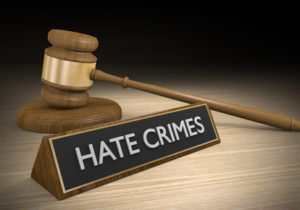According to the most recent FBI statistics hate crimes are up 17% nationwide. Orange County is reporting a 16% increase for 2017. Hate crimes have increased in each year over the last three years. Over that three-year period hate crimes have increased by 44% statewide in California.
Hate incidents and crimes in Orange County range from acts of vandalism to verbal assaults to physical attacks. Irvine police are investigating a recent “hate incident” in Irvine as a “hate crime.” The incident involved anti-semitic graffiti defacing the wall of Beth Jacob Synagogue, just 4 days after the mass shooting at a Pittsburgh synagogue.
The distinction between a hate incident and a hate crime is an important one.
A hate incident is behavior or an action that is motivated by hate, but does not rise to the level of a crime, and is legally protected by the First Amendment right to free expression. The Constitution allows people to express themselves, even if the expression is hateful or cruel, as long as it does not interfere with another’s civil rights.
Examples of hate incidents are:
- name calling and insults
- offensive jokes
- distributing hate material in public
- displaying hate material on your own property
- malicious complaints
A hate incident can be a hate crime. When a hate incident threatens a person or property it may rise to the level of a hate crime.
A hate crime is any criminal act against a person, group or property motivated by gender, race, nationality, sexual orientation, religion, or disability. Examples of hate crimes are:
- threat of violence against someone in these protected groups
- physical assault that results in injury
- public disturbance
- vandalism
- intimidation
- property damage
A hate crime can violate either state or federal statues. The two major statues in California related to hate crimes are:
- Penal Code 422.6 that makes it a crime to interfere with someone’s civil rights, or to damage and destroy property because a person is in the protected class.
- Penal Code 422.75 provides that if a crime is committed in part motivated by the fact the victim is a member of a protected class penalty enhancements can be applied.
A crime can be prosecuted as a federal hate crime if:
- the California Penal Code does not cover the victim or the act;
- the federal government determines that it is in the public interest the crime be prosecuted by the United States;
- local law enforcement is unable or unwilling to prosecute the case.
Federal statues involving hate crimes include:
- The Civil Rights Acts of 1964 & 1968
- The Matthew Shepard and James Byrd Jr. Hate Crimes Prevention Act
- Criminal Interference with Right to Fair Housing
- Damage to Religious Property, Church Arson Prevention Act
- Violent Interference with Federally Protected Rights
- Conspiracy Against Rights Act
California takes hate crime seriously. California Attorney General has a Hate Crime Rapid Response Team that acts as a supplemental resource for local, state and federal enforcement agencies’ investigation and prosecution of hate crimes.
To be convicted of a hate crime prosecutors must prove that the crime was committed specifically because of the victim’s gender, nationality, sexual orientation religion or disability. Both misdemeanors and felonies can be prosecuted as hate crimes if they meet the criteria of intent against a member of a protected class.
Misdemeanor hate crimes may bring a penalty of up to one year in jail and a $1000 fine, or an additional year and up to $5000 in fines if charges include force, threats or intimidation. A prior conviction may add up to 160 hours of community service or additional time in jail.
Penalties for felony hate crimes generally involve sentence enhancements that can add up to 4 years in prison, and / or an additional year for each prior conviction.
The attorneys at the Law Offices of David Stein are available for a no-cost consultation about any criminal matter. With years in Orange County criminal defense, we have the experience and relationships with prosecutors to help you get the best possible outcome. Call us today at (949) 445-0040 or email us online here.

